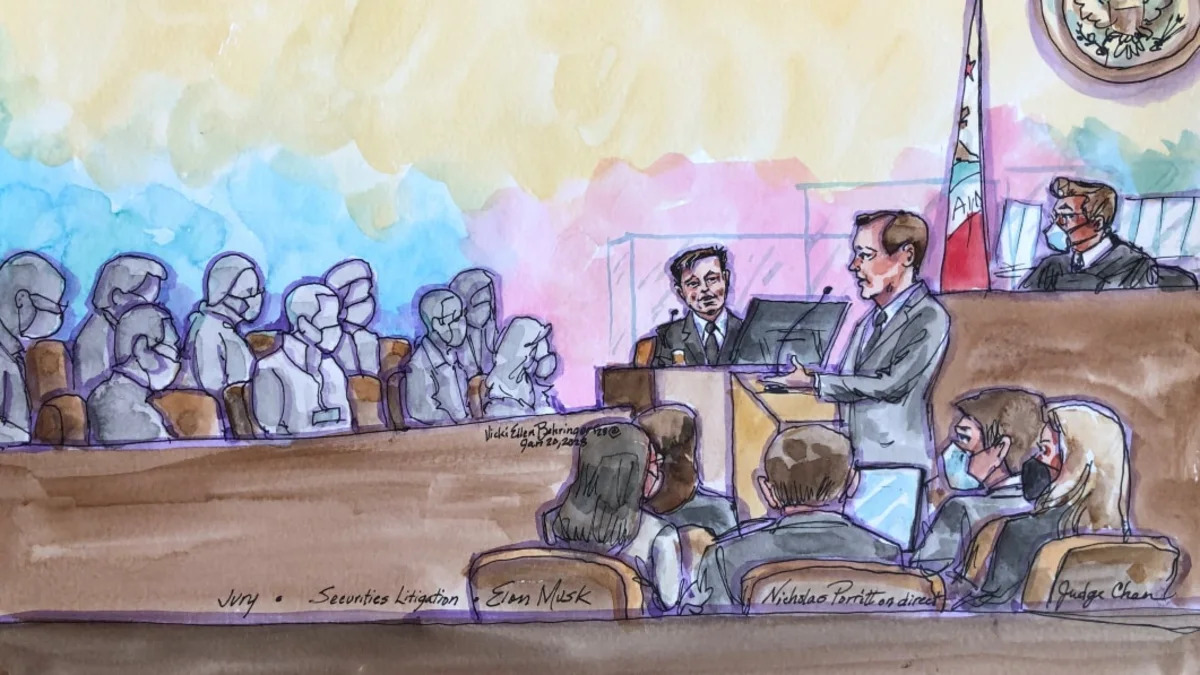SAN FRANCISCO — Elon Musk returned to federal court Monday in San Francisco to testify in a class action lawsuit filed by Tesla investors alleging he misled them with a tweet.
In the tweet, which resulted in a $40 million settlement with securities regulators, Musk claimed he had lined up the financing to take Tesla private in a deal that never came close to happening.
The trial hinges on the question of whether a pair of tweets that Musk posted on Aug. 7, 2018, damaged Tesla shareholders during a 10-day period leading up to a Musk admission that the buyout he had envisioned wasn’t going to happen.
Musk, who said Monday he “had trouble sleeping last night and unfortunately I am not at my best,” testified that it was important for jurors to know that he “felt that funding was secured” due to his ownership of “SpaceX stock alone."
“Just as I sold stock in Tesla to buy Twitter. ... I didn't want to sell Tesla stock but I did sell Tesla stock,” he said of the stock sale to make up for the lack of funding from other sources for his $44 billion deal to take Twitter private. Musk sold nearly $23 billion worth of his car company’s shares between last April when he started building a position in Twitter, and December.
“My SpaceX shares alone would have meant that funding was secured,” Musk said of the 2018 tweets.
Even before Musk took the stand on Friday, U.S. District Judge Edward Chen had declared that the jurors can consider those two tweets to be false, leaving them to decide whether Musk deliberately deceived investors and whether his statements saddled them with losses.
Musk has previously contended he entered into the SEC settlement under duress and maintained he believed he had locked up financial backing for a Tesla buyout during meetings with representatives from Saudi Arabia’s Public Investment Fund.
Musk told jurors that he had discussions with the Saudi Public Investment Fund about the transaction. He said the amount required for the fund was “potentially” less than $10 billion. Court filings indicate that Musk himself owned about 19% of Tesla at the time. The billionaire would have needed more than 50% to take the company private.
“The thing that was absolutely unequivocal is that they were absolutely supportive of taking Tesla private,” Musk said. “Unequivocal, without hesitation.” The PIF’s governor, Yasir Al-Rumayyan, had checked with Saudi Arabia’s Crown Prince, Musk said. “I took that to mean it was a done deal.”
The trial requires jurors to delve into Musk’s state of mind when he tweeted on Aug. 7, 2018, that he had “funding secured” to take Tesla private at $420-a-share and added that “investor support is confirmed.”
Nicholas Porritt, a lawyer for the investors, prodded Musk with questions about why there was nothing in writing from the Saudis and no details on the specific amount that the PIF would pony up.
“That’s not really how they do business,” Musk said. “If they say they’re going to do something they do. A signed document is neither here nor there.”
In the first of the 2018 tweets, Musk stated “funding secured” for a what would have been a $72 billion — or $420 per share — buyout of Tesla at a time when the electric automaker was still grappling with production problems and was worth far less than it is now. Musk followed up a few hours later with another tweet suggesting a deal was imminent.
Nicholas Porritt, a lawyer representing Tesla shareholders, asked Musk if he “went with 420 because it was a joke your girlfriend enjoys.” Musk replied he thinks there is “some karma” around the number 420 — which is also a slang reference to marijuana — although he added he doesn't know “if it's good karma or bad karma at this point.”
He then said the number was a "coincidence" and it represented a 20% premium of Tesla's share price at the time.
After it became apparent that the money wasn’t in place to take Tesla private, Musk stepped down as Tesla’s chairman while remaining CEO as part of the Securities and Exchange Commission settlement, without acknowledging any wrongdoing.
Contains material from Bloomberg News.


Sign in to post
Please sign in to leave a comment.
Continue